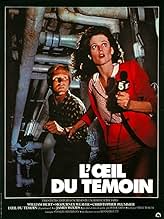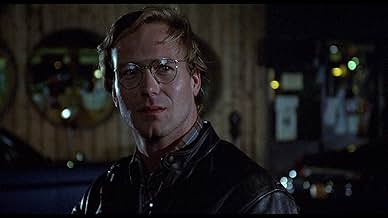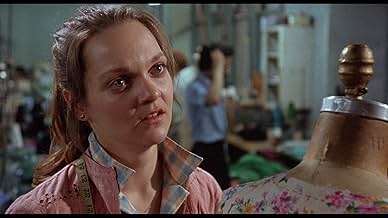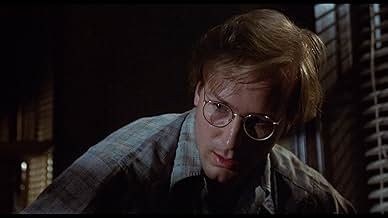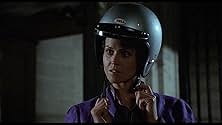VALUTAZIONE IMDb
5,9/10
6113
LA TUA VALUTAZIONE
Aggiungi una trama nella tua linguaA janitor who claims he's seen a murder becomes romantically involved with the glamorous TV reporter covering the story.A janitor who claims he's seen a murder becomes romantically involved with the glamorous TV reporter covering the story.A janitor who claims he's seen a murder becomes romantically involved with the glamorous TV reporter covering the story.
Sharon Chatten
- Israeli Woman
- (as Sharon Goldman)
Recensioni in evidenza
This movie is great fun to see William Hurt, James Woods and Sigourney Weaver at the beginnings of their careers and when they were experiencing a good deal of success. The rest of the cast is top-notch. The story is very interesting and effective, though I found the film a bit uneven and slow.
William Hurt plays a Manhattan Janitor named Daryl Deaver, who is obsessed with a local newswoman named Tony Sokolow(played by Sigourney Weaver). When a Vietnamese man with a shady past is murdered in Daryl's building, he takes full advantage of meeting his crush by insinuating that he knows more about the murder than he does. Tony goes along with him, flattered but unsure. When the true killers get wind of Daryl's story, they plan on eliminating him, and before they know it, their really is a conspiracy to report...
Good acting by its fine cast(which includes James Woods, Morgan Freeman, and Christopher Plummer) cannot save this contrived and unconvincing mystery, which just doesn't amount to much.
Good acting by its fine cast(which includes James Woods, Morgan Freeman, and Christopher Plummer) cannot save this contrived and unconvincing mystery, which just doesn't amount to much.
There is a murder without an apparent motive, so the viewer is in the dark for over half the film. When someone is killed without the audience being involved with the "why", interest quickly wains. Such is the case with "Eyewitness". Despite totally acceptable acting from a terrific cast, the film seems slow and constantly bogging down in blind alley subplots. When the motive for the murder is finally revealed, it almost seems like it comes out of a different movie, having little to do with what precedes it. William Hurt is very good as the mild mannered janitor with a crush on television news reporter Sigourney Weaver. Christopher Plummer is very effective in bad guy roles such as here, or in films like "The Silent Partner". James Woods plays James Woods, which is always interesting. Overall though, things never come together, due mainly to the muddled script. - MERK
This 1981 murder thriller, from a big studio with big stars of the time, with corny vintage taglines and advertisements, is good entertainment squarely because it pays more application to its people than its story. It's indubitably set in America, from the innards of a Manhattan boiler room to the newsroom of a TV station, even though it's about such real, involved, curious, and occasionally hilarious people that it have got to at the least be transatlantic.
This underrated neo-noir stars William Hurt as a janitor who happens upon proof that could lead to the conclusion of a murder investigation. But he doesn't go to the police with it because he's too reticent, too reflective, too doubtful of what he's seen and, mainly, he's too much in love from a distance with Sigourney Weaver's TV news reporter. Perhaps he can gain her regard by giving her the inside story.
There are other dilemmas. Sigourney Weaver's fiancée is an Israeli agent played by Christopher Plummer, who is embroiled in cloak-and-dagger overseas interventions to smuggle Jews out of the Soviet Union. His plan concerns secret fees to a corrupt Vietnamese agent who has now moved to Manhattan. The other characters include James Woods, as Hurt's impetuous and short-fused best friend and recently fired colleague, and Steven Hill and Morgan Freeman as a couple of stoic cops who ponderously trace leads in the case. One of their memorably stoic quips: "When Aldo was a little boy, he must have wanted to be a suspect when he grew up."
The advancement and resolution of the murder mystery are handled rather conventionally by director Peter Yates, who made some great thrillers like The Hot Rock and Bullitt, and his screenwriter, Steve Tesich. A climactic showdown in a midtown riding stable and its barely existent denouement has a touch of every thriller from the 1980s. But what makes this movie so enjoyable is the way Yates and Tesich and their characters play against our assumptions. It shows that there really is no excuse for a lack of cutting edge or creative spirit in genre films, because this one achieves a very poised harmony of the familiar and the original, predictability and unpredictability. Genres rely upon the audience's savvy and familiarity, on the seasoning they've stengthened from seeing movies and the frame of comparable encounters from they can evoke.
Weaver is not only a TV newswoman, but also a determined pianist on the side and the dejected daughter of her oppressive parents. Hurt is not only a janitor but also an emotional introvert, an animal lover who can rhapsodize his way into Weaver's heart. Woods is not only an unhinged janitor but also the forceful advocate of a marriage between his sister and Hurt. Hurt and the sister continue the engagement because they are both too nice to tell the other one they're not in love. And as a mystery thriller, it gives us multiple conceivable suspects and resolutions to the murder it sets up as a way of misleading us until the proper time to reveal the killer.
I've seen so many thrillers that, honestly, I don't always care that much how they resolve lest they're particularly well-crafted. What I like about this buried gem is that, where it has regard for how it turns out, it has even more regard for the essence of its scenes. There's not a scene in this movie that just constitutes plot information. Every scene defines characters. And they're developed in such uncommon integrity to the way people do act that we get all the more consumed in the mystery, merely considering that we comparatively trust it could actually be real. Actually, I'm going to buckle and say that there is one tagline for this movie that is pretty good: "You're never more vulnerable than when you've seen too much."
This underrated neo-noir stars William Hurt as a janitor who happens upon proof that could lead to the conclusion of a murder investigation. But he doesn't go to the police with it because he's too reticent, too reflective, too doubtful of what he's seen and, mainly, he's too much in love from a distance with Sigourney Weaver's TV news reporter. Perhaps he can gain her regard by giving her the inside story.
There are other dilemmas. Sigourney Weaver's fiancée is an Israeli agent played by Christopher Plummer, who is embroiled in cloak-and-dagger overseas interventions to smuggle Jews out of the Soviet Union. His plan concerns secret fees to a corrupt Vietnamese agent who has now moved to Manhattan. The other characters include James Woods, as Hurt's impetuous and short-fused best friend and recently fired colleague, and Steven Hill and Morgan Freeman as a couple of stoic cops who ponderously trace leads in the case. One of their memorably stoic quips: "When Aldo was a little boy, he must have wanted to be a suspect when he grew up."
The advancement and resolution of the murder mystery are handled rather conventionally by director Peter Yates, who made some great thrillers like The Hot Rock and Bullitt, and his screenwriter, Steve Tesich. A climactic showdown in a midtown riding stable and its barely existent denouement has a touch of every thriller from the 1980s. But what makes this movie so enjoyable is the way Yates and Tesich and their characters play against our assumptions. It shows that there really is no excuse for a lack of cutting edge or creative spirit in genre films, because this one achieves a very poised harmony of the familiar and the original, predictability and unpredictability. Genres rely upon the audience's savvy and familiarity, on the seasoning they've stengthened from seeing movies and the frame of comparable encounters from they can evoke.
Weaver is not only a TV newswoman, but also a determined pianist on the side and the dejected daughter of her oppressive parents. Hurt is not only a janitor but also an emotional introvert, an animal lover who can rhapsodize his way into Weaver's heart. Woods is not only an unhinged janitor but also the forceful advocate of a marriage between his sister and Hurt. Hurt and the sister continue the engagement because they are both too nice to tell the other one they're not in love. And as a mystery thriller, it gives us multiple conceivable suspects and resolutions to the murder it sets up as a way of misleading us until the proper time to reveal the killer.
I've seen so many thrillers that, honestly, I don't always care that much how they resolve lest they're particularly well-crafted. What I like about this buried gem is that, where it has regard for how it turns out, it has even more regard for the essence of its scenes. There's not a scene in this movie that just constitutes plot information. Every scene defines characters. And they're developed in such uncommon integrity to the way people do act that we get all the more consumed in the mystery, merely considering that we comparatively trust it could actually be real. Actually, I'm going to buckle and say that there is one tagline for this movie that is pretty good: "You're never more vulnerable than when you've seen too much."
For weeks I have been looking for the perfect structure of a screenplay. This film had me in the first ten minutes because of what it set itself up to be. The structure had the camera following one principle lead, going off to meet the other principle lead, who would subsequently go off to meet the character from which the major plot developed. "Eyewitness" is a great film which showed me what I have been missing throughout my entire movie-watching career. After you meet the principle characters through following them, some kind of sub-plot, or major plot, or principle theme, will develop, and it will truly free up the entire movie. This is basically the structure of almost every independent film I have seen. Not to be missed.
Lo sapevi?
- QuizSigourney Weaver's character was based on an object of infatuation that Steve Tesich had with a Washington, D.C. anchorwoman. He recorded her broadcasts and had pictures of her like William Hurt's character had in the film of Weaver. The actual anchorwoman was brought in by Peter Yates for technical support to make Weaver's character more believable.
- BlooperThere is a security camera very obviously placed in the outer office outside of where the murder takes place, yet during the investigation no mention is made of it.
However, perhaps (circa 1981) it's a closed-circuit, live feed only (no recordings made), and no one viewing the live security screens noticed anything unusual.
- Citazioni
Lt. Jacobs: When he was a kid, Aldo must have wanted to be a suspect when he grew up.
- Versioni alternativeRuns 93 minutes long on Capacitance Electronic Disc (CED), also commonly known RCA Selectavision Videodisc.
- ConnessioniFeatured in Sneak Previews: Eyewitness/Tess/The Competition/The Dogs of War (1981)
- Colonne sonorePiano trio no. 1 in D minor, op. 49: ii. Andante con moto tranquillo
Written by Felix Mendelssohn
[Performed at the Sokolows' house concert]
I più visti
Accedi per valutare e creare un elenco di titoli salvati per ottenere consigli personalizzati
- How long is Eyewitness?Powered by Alexa
Dettagli
- Data di uscita
- Paese di origine
- Lingua
- Celebre anche come
- Consigna: Matar al testigo
- Luoghi delle riprese
- Azienda produttrice
- Vedi altri crediti dell’azienda su IMDbPro
Botteghino
- Budget
- 8.500.000 USD (previsto)
- Lordo Stati Uniti e Canada
- 6.400.000 USD
- Lordo in tutto il mondo
- 6.400.000 USD
Contribuisci a questa pagina
Suggerisci una modifica o aggiungi i contenuti mancanti

Divario superiore
By what name was Uno scomodo testimone (1981) officially released in India in English?
Rispondi


